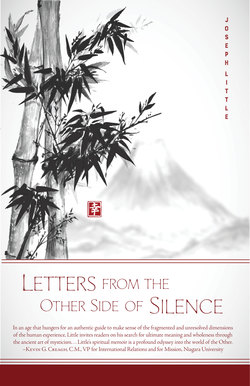Читать книгу Letters from the Other Side of Silence - Joseph Little - Страница 8
August 2010
ОглавлениеThe past several months have been one long string of Hallelujahs. Having kicked the martinis, the books, the Netflix to the curb, I found a life lean and kinetic, pulsating like the body of a teenager. And the world, it now bulges with significance: Every tree branch bows under the weight of some unutterable wisdom. Every drop of water seems ripe with creation.
The air has a kind of electricity to it, and time itself jerks along in discrete units. There are days when I swear I can sense the universe reconstituting itself moment by moment, like a film or a TV screen: individual pulses too fast for the eye to perceive. The quanta are real, I say to myself, time’s apparent continuity, the illusion.
Recently, I’ve turned to poetry to try to express these holy moments. It’s not particularly good poetry, mind you, but what is astonishing to me is the ease with which they write themselves into existence. They come to me in the car, on the street, in the shower. They come to me fully formed as if someone else wrote them. This summer, a few came to me while I was resting in a hotel garden in Poland (I was visiting my grandfather’s birthplace, Szeroki Kamien, and got delayed by the floods). It was as if I’d opened my mouth and butterflies flew out. I wrote them down and sent them off to The Antigonish Review. We’ll see what comes of that.
In private conversations, I’ve been catching myself using phrases like “The Great Unnameable” and “The Cosmos” instead of the “God” and “Heaven” of my upbringing. And in my journal writing, I pour onto scraps of paper words at once mysterious and oddly familiar, like:
What am I? I am aware of myself as a resilient bubble deep in the sea, confident I will be reunited with the Atmosphere from which I was separated so long ago.
A deeper spiritual life. What does that mean? Deeper into ourselves? Deeper as a more intense emotion? Deeper into the marrow of others?
On the leading edge of the mind, only crusts of words remain.
Sweetness, then darkness. For every A-B, there is a B-A that follows.
What is this palindromic nature that light and heat record?
That I might wince and wonder, of might and much discord, me or my evil twin, pecking away at my soul, a buzzard within.
Raises me to reverie
Rapids of the mind, left behind
Divining the skies
Scratching the wind
You are to me as sun to snow.
There’s a difference between (1) the idea of growing old together and (2) growing old together. The second one is truer; the first, an expectation, a mental construct, an artifice. It impedes the flow of reality, places a cracked window between you and existence. There is a peril to conceptual living.
I browse magazines and all I see are abstractions, concepts bereft of a pulse: Christian, Republican, obesity, shamanism, fascism, Buddhism, modernism. I think to myself, I’ve never met an -ism. I scour the language but find only words that stand in for whole families of experiences, moments of the human condition so cleaned and shaven by the sharp edges of thought that I’m sure something important has been lost. I slowly focus on the moment, I slowly get beyond the words, beyond the analytic categories, beyond the paper, and I descend into silence. That’s when I come alive.
I can sneak up on my mind, startle it, separate its stream of consciousness from a faint but growing awareness of reality “out there.” I can see my obsessiveness, my worry, my personality, as distinct from the true nature and dangers and delights of the world. And it gives me peace.
I’m also more aware of my emotions these days, and less likely to be held captive by them. I can see that they are conjured by my mind, and, like the weather, they tend to breeze by in time. It’s not that they’re unimportant—my emotions, my thoughts—but they’re not the totality of me. They are like the atmosphere, and there is something to me akin to the earth.
There are days when I refuse to use language at all to refer to the divine out of the growing conviction that all language—even a symbol like a circle or a cross—is inadequate for such a purpose, a slap in the face of the Great Unnameable, though even here I have to remind myself that there’s no face to slap, yet another example of language’s folly. The divine is perfect, language is not, to use the latter as a substitute for the former is therefore ill conceived. Isn’t it? This seems to be the simple logic that clothes the naked impulse emanating from me, but it’s the impulse and not the logic that motivates my silence, an impulse whose origin I can trace precisely to Pacaya, when that wall of rock dismantled itself at 8,000 feet and in so doing dismantled me, an impulse which over time has taught me to think in plain truths and then not to think at all.
Back home, on the shores of Lake Ontario, I sit and chant to the beating of an inner rhythm and stir and tremble and, Hallelujah, spill out into the universe over and over again. It’s my finest form of prayer.
